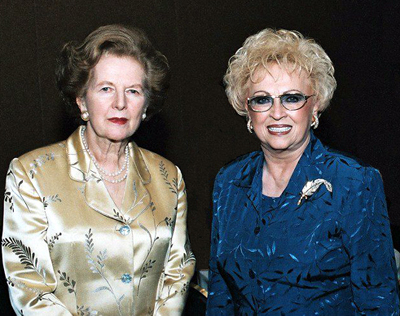Yesterday, the world mourned the loss of Margaret Thatcher, who was Great Britain’s first female Prime Minister. Considered the most popular British Prime Minister since Winston Churchill, Thatcher undoubtedly leaves behind a remarkable legacy as a strong female leader unafraid to fight for values, national pride, and truth. According to an official statement released by President Obama, Thatcher was, “One of the great champions of freedom and liberty, and America has lost a true friend.”
“If you just set out to be liked, you would be prepared to compromise on anything at any time, and you would achieve nothing.”
Before becoming Prime Minister, Margaret Thatcher was a shopkeeper’s daughter. A child during the Great Depression, Thatcher watched her mother and father work incessantly just to put food on the table. She, herself, was not a stranger to hard work. Whether she was running the cash register in her family’s grocery store or volunteering in her local parish charity, everything Thatcher did was with dedication. And it was that diligence that enabled her academic achievements and later a partial scholarship to study chemistry at Somerville College, Oxford.
 Baroness Thatcher and Mrs. LaHaye at CWA Convention 2000. |
Thatcher stressed the importance of a strong work ethic even in her role as Prime Minister. Never one to “subsidize idleness,” Thatcher was afraid that Britain was transforming into a nanny state. Viewing it as a threat to society, she overhauled the entire British Welfare State, creating incentives for employed adults. By encouraging programs like the Jobseeker’s Allowance program, which cut funding for those unemployed for over two years and increased restrictions on unemployment benefits, Thatcher successfully scaled back what had become the British Socialist state.
“Disciplining yourself to do what you know is right and important, although difficult, is the highroad to pride, self-esteem, and personal satisfaction.”
Shortly after her arrival at Oxford, Thatcher joined Oxford University’s Conservative Association (OUCA) and dedicated all of her discretionary time to OUCA’s activities. Later, when asked why she made the decision to join the Conservative Party as a student, Thatcher replied, “Both by instinct and upbringing I was always a ‘true blue’ conservative. No matter how many left-wing books I read or left-wing commentaries I heard, I never doubted where my political loyalties lay.”
As leader of the Conservative Party, Thatcher was so uncompromising in her ideals that she earned the nickname the “Iron Lady.” At Concerned Women for America’s (CWA) Convention 2000, held September 14-16 in Washington, D.C., Thatcher, serving as the honorary keynote speaker, addressed the future of conservatism by stating:
I’ve never known a period when the fundamental values that sustain our civilization have been challenged as much as they are now. That is a cause of concern, not only to every government, but also to all sound, good-minded people. Certain standards are being steadily undermined on a very large scale, like the sanctity of the family. This is extremely difficult.
Besides conservative values, Thatcher was a woman who upheld Christian principles. In her autobiography, Thatcher recalled, “Our lives revolved around Methodism.” Embracing her faith, Thatcher utilized lessons from the Old and New Testament in developing her moral judgments. In nearly all of her speeches as Prime Minister, Thatcher gave homage to God and His place in public policy. In fact, Thatcher considered the most important speech of her lifetime to be the one given to the General Assembly of the Church of Scotland in which she reminded her audience that, “We are a nation whose ideals are founded on the Bible.”
“Any woman who understands the problems of running a home will be nearer to understanding the problems of running a country.”
Thatcher’s extraordinary life bears witness to the importance of family. She has stated many times that her achievements are a result of the support of her husband Denis, who she referred to as, “the golden thread running through my life.” The man, “who has made everything possible.” And she recognized the importance of family as a matter of national security.
In her convention address to CWA, she said:
In days gone by, we knew that a good home, good parents, good education, good local facilities, and a background of liberty and the rule of law would give everyone a good start. Unfortunately, the traditional family is not so traditional any longer. There are many single parents, and this puts an extra burden on the schools.
We have figures available that show the frequency of crime among pupils and particularly among some minority races. It is not a function of race. It is the absence of marriage that characterizes the families of pupils who break the law. The absence of marriage robs the pupils of the security they would have had.
“Being powerful is like being a lady. If you have to tell people you are, you aren’t.”
Margaret Thatcher will forever be remembered as an extraordinary woman and national leader. We know that each person comes to this earth for a specific time and purpose. while we might not choose how and when we die, we can choose to make the most of each day we have to live. Imagine what the world would look like if we had more Margaret Thatchers today?

